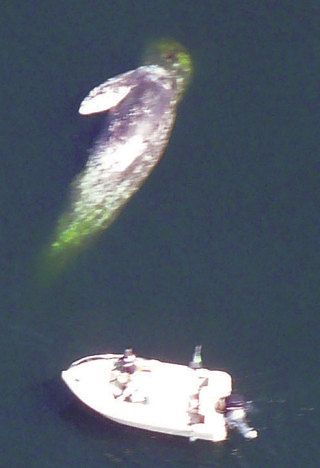The dead gray whale that floated past Langley on Monday had yet to find a resting place Tuesday, officials said.
“The tide picked it up, and we don’t know where it’s going to leave it,” Howard Garrett of Orca Network, the local whale-tracking organization based in Greenbank, said Tuesday morning.
Its last reported position was just north of Gedney Island, west of Everett, in Possession Sound.
Garrett said the current extreme high and low tides in the area may push the whale west toward Admiralty Inlet, but that’s just a guess.
“With these tides, it could be carried a long way,” he said about noon Tuesday.
The Coast Guard was monitoring the mammal’s position and sending out reports to mariners in the area “so they don’t run over it or destroy their boats,” Petty Officer John Spadafora of the Coast Guard’s search and rescue unit, said Tuesday morning.
“The tide runs in three different directions out there,” Spadafora said. “It could go anywhere.”
The full-grown 40-foot-long adult male whale was first spotted about 8 a.m. Sunday floating on its side off the northwest section of Camano Island north of Madrona Beach opposite Penn Cove.
On Monday, it drifted past Langley, then headed south in Saratoga Passage, as TV cameras in helicopters tracked its progress.
A crew of a crab boat in the area volunteered to tow the carcass to Oak Harbor for examination, but “it was too big for the boat,” Garrett said, and the whale was cut loose about 4 p.m. Monday.
He said the whale settled off Sandy Point south of Langley and appeared to be headed toward the beach on the tide Monday evening, but residents reported that the tide had carried it out again about 10 p.m.
Garrett said he hopes the whale will wash up on shore soon, so Orca Network scientists can examine it.
“If it takes more than a week, it will be too far gone,” he said. “And once the bloating breaks through, it could sink pretty fast.”
He said it appeared the gray whale had been attacked by a killer whale at some point, but that probably wasn’t the cause of its death. He said the whale may be the same one that had been “looking poorly” in the Holmes Harbor area during the past month.
Garrett said it was uncertain if the whale was a member of the group of 10 or 12 that have regularly visited Saratoga Passage during their annual migration from Mexico to Canada.
For years, the gray whales have stopped off in the area to feed on abundant beds of ghost shrimp in the area.
The annual visit of the whales is commemorated by the city of Langley, which celebrated a well-attended Welcome the Whales Day just a week ago.
Kristin Wilkinson, a marine mammal stranding specialist with the National Oceanic and Atmospheric Administration in Seattle, said the agency has been monitoring the whale’s progress and is standing by to assist Orca Network once the carcass washes up on shore.
NOAA oversees mammal-stranding networks in Washington and Oregon and helps organize examinations and carcass disposal.
She said once a stranded mammal has been examined, it may be left where it is on the beach, with the property owner’s permission. Or it may be buried above the tide line, or towed out to sea and sunk.
“It really just depends on the situation and locality,” Wilkinson said. “There are usually a handful of options we can use.”
She said that determining the cause of death of a whale can sometimes take several months of analysis.
Wilkinson said that often, scientists return to the site of a decomposed whale to retrieve the bones for study.
While whale strandings have been rare in Saratoga Passage, it’s not uncommon to have five to 10 a year in Washington and Oregon, Wilkinson said.
There have been five reported whale strandings this year. Last year there were three, in 2007 there were seven and in 2006 there were 12, she said.
“There really are no alarm bells being raised, but we’re keeping our eyes out,” she said.
She said the last unusual number of gray-whale deaths was in 2005, when there were 16.
Wilkinson said the reason for that number of deaths remains undetermined, but that often in such abnormal years, it’s a case of the whale population growing too large to be sustained by its environment.
Meanwhile, the Langley whale was the second whale death reported in the area.
Wilkinson said a gray whale 20 to 30 feet long, perhaps a yearling or a sub-adult, was found floating dead just south of Cherry Point off Gulf Road Beach north of Bellingham on Monday.
She said the whale, whose gender hadn’t been determined, had been secured to pilings, and a stranding network team was on the way Tuesday to begin an examination.
Earlier this month, gray-whale strandings also were reported in Neah Bay and at Illwaco, off the Washington Coast, Wilkinson said.
To report a mammal sighting or stranding, call Orca Network at 1-866-ORCANET.



